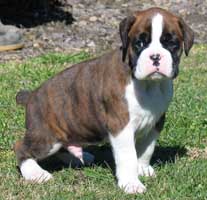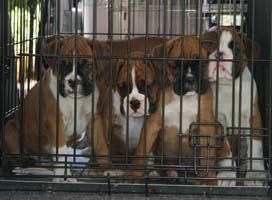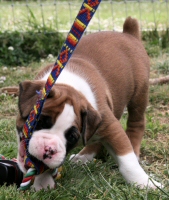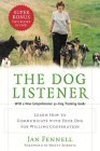
Training Your Ronin Boxer Puppy
General Principles
Training techniques you use with your puppy should capitalise on natural behaviour. Training based only on punishment just makes puppies devious. So, concentrate on rewarding good behaviours and guiding puppy away from bad ones. Use simple one word commands such as “Good” or “No”. Don't reward whining or barking by giving attention.
Always have a supply of treats to reinforce good behaviour. For treats use biscuits or, better still, cut up small cubes of cheese, a food favourite of all dogs, and keep them in a sealed plastic bag.
Remember that puppies each learn at different rates. So you may need patience.
Make sure the whole family knows "the rules".
Finally, be consistent!
Toilet Training

Your puppy will need to toilet hourly and immediately after meals or sleeping. It will show that it wants to go by: being restless, sniffing the floor and going to a spot where it went previously. Carry puppy to where you want it to toilet. Praise enthusiastically when it has finished.
Don't make a big issue of an accident by hitting puppy or rubbing puppy’s nose in it. What you want will be too complicated for puppy to understand. Instead, concentrate on guiding puppy to the correct place next time. The more time you spend with your puppy the less likely you are to miss when it wants to go to the toilet. Finally, regularly take puppy to the correct toilet place, so it understands the routine of going outside to toilet.
As your puppy grows up, you should accustom it to going to the toilet while on the lead and on different surfaces.
A few days hard work will pay off. Remember, accidents are your mistake, not your puppy's. Again make sure the whole family knows "the rules".
Crate Training

Crates for dogs come either as wired frame cages or moulded plastic kennels with wire fronts. A crate:
- is an excellent travel container which avoids the dangerous practice of having a dog loose in a motor vehicle,
- is a help for toilet training by providing a place puppy is reluctant to soil,
- reduces separation anxiety by giving puppy a secure “home”,
- stops destructive behaviour, and
- is a safe place for your puppy, or grown dog, at dog shows or other outdoor events.
The crate should become your puppy’s favourite indoor kennel. So never use it as a punishment. Don't crate puppy if it has diarrhoea or has just drunk large amounts of water. Remember that small puppies under twelve weeks old need to toilet often.
Prepare the crate by positioning it near you, putting bedding or a blanket on the floor, leaving the door open. Then drop a few treats in the crate. When puppy finds them, praise enthusiastically. Repeat the treat-dropping exercise until puppy happily goes into the crate. Then serve meals in the crate.
Gradually accustom puppy to staying shut in the crate for longer periods, making sure it has toileted and isn't wearing a collar that could catch in the wire. During the early stages of training, only shut puppy in for a few minutes and remain close by to avoid triggering separation anxiety. Continue extending time in the crate by leaving the room for longer periods.
Once you have accustomed your puppy to the crate, take it for it for a trip in your motor vehicle. Be patient and persistent with the training and your Ronin Boxer will be like ours who love hopping into the crate for a trip in the van.
Bite Inhibition

Jaws and teeth are to dogs what hands and fingers are to humans. So, teeth are the natural tools puppies use for exploring. However, you don't want your puppy to bite, nip or even mouth you.
When your puppy bites, yelp, remove your hand and stop giving it attention. Don't respond by hitting, as you'll trigger an aggressive response and puppy will bite more. As puppy learns, respond with yelps after progressively more gentle bites until puppy stops mouthing altogether. Again, make sure the whole family knows "the rules".
Puppy Preschool
Talk with your vet about taking you puppy to preschool. We recommend preschool for all puppies. Your puppy will enjoy it and you'll learn obedience training skills that go beyond those outlined in this manual.
Puppy preschool is a neat way to meet other people who have puppies the same age as yours. Over the years we've been to about eight different preschool courses with our own puppies. To extend the benefits of preschool, also take your puppy to plenty of other interesting places with new sights and sounds.
The Recall

Boxers can be naughty about not coming back when off the lead. Such bad habits start at home. So, when your puppy is coming to you anyway, say puppy’s name, then "come", and give puppy a treat.
When going out during the first three or four months, keep your puppy on about three metres of rope. Then puppy will be safe from harm, won’t over-exercise and will easily recall. Only call your puppy to you when you know it'll come, otherwise you are just teaching puppy to ignore you. Wait until puppy is watching you, call its name and then say "come." If puppy doesn't come, gently tug on the rope. Then be positive and excited, and give a food reward as soon as puppy does come. Sometimes it helps if you crouch to puppy’s level waving your arms. Be a fun target!
At first use the rope like a long leash. Then as puppy learns, let it drag the rope. If puppy refuses to come, you can grab the rope to entice it back. But be careful not to take puppy anywhere it'll hang itself!
Remember, the recall starts at home and you can easily practise it twenty or thirty times a day!
The Dog Listener, by Jan FennellJan Fennell shows readers how to successfully train their canine companions using gentle and respectful techniques. She shares anecdotes and advice from her years of experiences (both good and bad). Fennell's techniques deal efficiently with canine problem behaviors by teaching owners to establish leadership while eliminating separation anxiety, nervous aggression, and destructive behaviors such as biting. She also notes ways to reassure overprotective dogs. Buy at Amazon.com. |
 |
| Home | News | Dogs | Puppies | Information | Downloads | Contact |
Designed by: Blue Kingfisher Web Design
© 2006-2017 Ronin Boxers